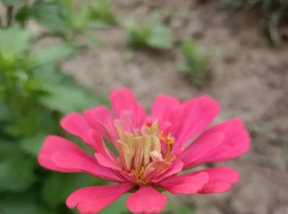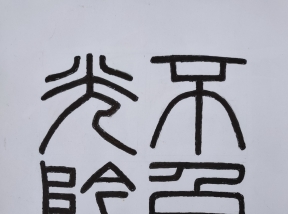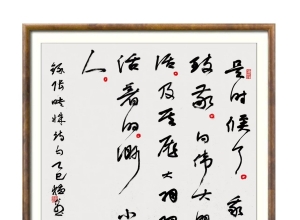本帖最后由 楊宗澤 于 2025-5-24 17:06 編輯
- 科恩里尤斯詩選(二)
-
- 楊宗澤 編譯
-
- Selected Poems of Kornelijus(Set Two)
Compiledand translated by Yang Zongze 圣杰羅姆的辯護詞
獅子與頭骨。太陽與黃沙。 那些不必要的東西從意識中離去,蒸發(fā)、滲透 進入安條克荒漠,肉體干涸,靈魂澄澈, 心智變得敏銳,堅硬的微粒沉淀在文字之中,等待 其他的眼睛,它們的光芒與生機轉化為新的 意象、意義與感知。四十天后, 摩西帶著石版從西奈山下來。 那些跟著蛇旗穿越沙漠的人們 讓亞倫用耳環(huán)和項鏈 為他們鑄造一個上帝的形象, 于是他鑄了一頭金牛,這在這些國度里 牛是古老而常見的象征,牛角之間有一個太陽圓盤, 在迷霧籠罩的未來,它曾載著歐羅巴漂向克里特島, 也許此刻它正溫順地立在馬槽旁…… (不,我們在此不會提及帕西淮,也不會提及錚錚作響的青銅。) 正因為如此,圣杰羅姆給摩西畫上了角,仿佛在邀請 我們走向一種舒適安寧的定居文明,走向民法, 走向橄欖樹和葡萄藤繁茂的清涼。但事實并非如此, 他用他的律法石版打破了這一象征,而這些石版—— 這一象征——將不得不重回山中。 和平不會到來,鮮血還將流淌數(shù)千年。 沉醉于鮮血與黃金,讓我們傳播未知的知識吧。 眾神會像鹿一樣蛻下它們的角,然后又重新長出,就如同我們 這些過客,需要為了那應許的永恒舍棄我們短暫的生命。 假先知們會誠實地向我們解釋一切。 而我們這些譯者,仍會繼續(xù)犯錯。 在大教堂的壁龕里,摩西頭上的角又一次長了出來。 寫于2020年8月
*圣杰羅姆是西方早期教會的教父之一,生活在公元4世紀至5世紀。圣杰羅姆以其對《圣經》的翻譯工作而聞名,他將希伯來文和希臘文的《圣經》翻譯成拉丁文,即通俗拉丁文本圣經,這一譯本在中世紀的歐洲教會被廣泛使用,對基督教的傳播和發(fā)展產生了深遠影響。此外,他博學多才,精通多種語言,在神學、文學等領域也有諸多著作和貢獻,對當時及后世的宗教思想和學術研究都起到了重要的推動作用。——譯者注。 *安條克荒漠指的是位于古代敘利亞地區(qū)安條克附近的一片荒漠區(qū)域。安條克是歷史上重要的城市,在不同時期為塞琉古帝國、羅馬帝國的重要據(jù)點。——譯者注。 * 西奈山通常指位于西奈半島南部的一座山,在猶太教、基督教和伊斯蘭教等宗教中具有極其重要的地位。在《圣經》故事里,上帝在西奈山向摩西顯現(xiàn),并賜給他十誡。西奈山是宗教信徒心目中的圣地。——譯者注。 *帕西淮 在希臘神話中,她是克里特島國王米諾斯的妻子。帕西淮因愛神阿佛洛狄忒的詛咒,愛上了一頭公牛,最終生下了半人半牛的怪物彌諾陶洛斯。——譯者注。 St. Jerome'sApologia
The lion and theskull. Sun and sand.
What is unnecessary leaves consciousness, evaporates, seeps
into the desert of Antioch, the bodydries, the soul clarifies,
the mind sharpens, and hard particles settle in letters waiting for other eyes,their light and life, to turn into new images,
meanings, perceptions. Forty days later,
Moses comes down from Sinai with tablets of stone.
People who went through the desert following a snake-flag
asked Aaron to cast for them an image of God from earringsand necklaces,
and he cast a golden bull, the old, normal symbol
in these countries, with a sun disk between its horns,
who floated Europa to Crete in the foggyfuture
perhaps standing meekly by the manger…
(No, we will not mentionPasipha? here or the sonorous copper.)
That's why Jerome givesMoses horns as if inviting
us to a cozy and peaceful settled civilization, to civil law,
the cool density of olive trees and vines. But no,
he breaks the symbol with the blocks of his law, the blocks –
into the symbol – will have to return to the mountain.
There will be no peace, blood will flow for millennia.
Drunk from him and gold, let us spread knowledge, what we do notknow. Gods will shedtheir horns like deer and grow them again, as we,
passers-by, will need to give up our short lives for promised eternity. False prophets will explain everything to us honestly.
And we will continue to make translation mistakes, foremen.
In the niche of the cathedral, Moses again with sprouting horns. August,2020
螳螂
詩歌的真諦是一樁令人非議之事。一千對赤身裸體交媾的情侶 連同他們的呻吟和扭曲之態(tài)與一個精妙的隱喻相比,都不值一提。 ——查爾斯·西米克
你再也沒有時間去哀傷地歌唱了——她說, 那個做事欠思量又善變的女人??—— 是時候讓你按照你隨意對待 這世界的倒影所招來的后果,變成一只甲蟲了, 盡管你曾認為這世界的倒影是存在的, 你讓自己變得渺小、隱匿、滿心懷疑, 將宣泄與高潮、狂喜混為一談…… 好吧—— 我說—— 我會變成一只螳螂, 一個修道院苗圃和花園的熱忱的訪客, 在昆蟲的食物鏈中占據(jù) 同樣的社會地位。 至少變成一只雌性螳螂或是大象的腳…… 沒人能逃脫變化。我已故的父親, 他總是試圖保護我 免受那個做事欠思量又善變的女人的傷害, 從夢的帷幔之后發(fā)問:你還會寫 你最歡快的詩句嗎?我覺得很奇怪: 一個那般嚴肅的人,讀著那些淫穢之詞, 卻又把那個放蕩不羈之人 推向隱喻的泥潭。
寫于2019年8月
*查爾斯?西米克(又譯查爾斯·西米奇)是一位著名美籍塞爾維亞詩人、散文家和翻譯家。1938 年出生于塞爾維亞,1954 年移民美國。他的詩歌風格獨特,常以簡潔而富有想象力的語言,將日常事物與超現(xiàn)實元素相結合,探索生命、記憶、時間和存在等主題,曾獲得過普利策詩歌獎等諸多重要文學獎項,在當代詩歌領域有著重要地位。——譯者注。 Praying Mantis
The truth of poetry is a scandal. A thousand naked fornicating couples
with their moans and contortions are nothing compared to a goodmetaphor
CharlesSimic You no longer havethe time to sing sadly – she said, the woman, whomakes, then considers, the spinner --
time for you to turn into a beetle according to the consequences that yousummoned by so casually treating the reflectionsof the world, though you considered that it exists,
made yourself insignificant, hidden, self-doubting,
confusing catharses with orgasms, ecstasies ...
All right – I said – I'll become a praying mantis,
a zealous visitor of monasterynurseries and gardens,taking on the same social status
in the food chain of insects.
At least a female or an elephant's foot… No one escapeschange. My dead father,
who always tried to protect me
from a woman-spinner who makes, then reconsiders,
asks from behind the cloak of a dream: will you still write
your happiest verses? I find it strange:
such a serious man, reading those obscenities,
yet pushing the libertine
into the mire of metaphors. August,2019 七月。花道。
酷熱的日子 終于結束。有時會下點雨。 一個念頭如同水塘里的小船, 朝著我的方向漂來,卻又擦肩而過。 我緊緊咬住夏日的咽喉, 牙齒因漿果或美酒而泛藍…… 檉柳、泛黃的萱草, 荷葉、泛紅的睡蓮, 黃櫨。小船已抵達 岸邊。你卻不在船上, 你在那束花的記憶里。 寫于2015年7月
July. Ikebana.
The hot days at last have ended. It rains sometimes. A thought like a boat in a puddle, carried my way but drifting past. I cling to summer’s throat with teeth blue with berries or wine… Tamarisk, yellowed daylily, lotus leaf, reddish water lily, smoke tree. The boat has reached the shore. You are not in it. You are in the bouquet’s memory. July,2015 file:///C:/Users/ADMINI~1/AppData/Local/Temp/msohtml1/01/clip_image002.jpg

Platelis. Foto Dirk Skiba_.jpg (83.53 KB, 下載次數(shù): 6)
下載附件
保存到相冊
2025-5-24 17:00 上傳
【作者簡介】科恩里尤斯?普萊特里斯 立陶宛當代著名詩人、散文家、文學批評家和詩歌翻譯家,通曉英語、俄語、波蘭語等四國文字。普萊特里斯1951年1月出生于立陶宛的希奧利艾,現(xiàn)為立陶宛藝術家協(xié)會主席。自1977年至今已有詩集《詞語與日子》、《橋上的家》、《風之陷阱》、《對著一條河的演講》、《潮標》、《萬能面具》和散文集《住在尼曼河邊》、《我們在流逝》、等十多種著作在國內外出版,另有大量詩歌翻譯作品在國內外報刊發(fā)表或結集出版,曾翻譯出版過艾略特、龐德以及波蘭當代著名詩人切斯瓦夫·米沃什(1980年諾貝爾文學獎得主)、愛爾蘭當代著名詩人謝默斯· 希尼(1995年諾貝爾文學獎得主)等人的作品。科恩里尤斯曾于2002年榮獲立陶宛國家文化藝術獎。 [About the Author] Kornelijus Platelis a well-known Lithuanian poet, writer,literary critic and poetry translator, born in Jan.1951 in ?iauliai, Lithuania, he currently serves aspresident of the Lithuanian Association of Artists. Since 1977 he has publishedover ten selections of poetry and prose such as Words and Days, Home on theBridge, Snare for the Wind, Orations to the River, Tidemark, Dwelling byNemunas, And We Are Passing, ALTERNATING MASKSand so on. Besides Lithuanian,Kornelijus has a good command of English, Russian and Polish andhas translated many poets’ works including great Eliot, great Pound, Czes?awMi?osz (an outstanding Polish poet, the winner of Nobel Prize in literature1980) and Seamus Heaney (an outstanding Ireland poet, the winner of Nobel Prizein literature 1995) . His poems have been translated into many languages andpublished at home and abroad. Among his many honors and awards is theLithuanian National Award for Culture and Arts (2002).

楊宗澤 _副本.jpg (54.14 KB, 下載次數(shù): 7)
下載附件
保存到相冊
2025-5-24 17:00 上傳
file:///C:/Users/ADMINI~1/AppData/Local/Temp/msohtml1/01/clip_image004.jpg 【譯者簡介】楊宗澤 (1953 — )筆名:瘦路,山東平度人,畢業(yè)于山東師范大學外文系英美語言文學專業(yè),中學退休教師,無黨派,中國作家協(xié)會會員,詩人,翻譯家,后意象主義詩歌流派代表性詩人之一。1999年12月被美國世界作家藝術家協(xié)會評選為1999年度最佳翻譯家,2024年12月被《中國當代詩歌導讀》編委會授予第七屆詩歌獎。已有詩集《浪漫季節(jié)》、《沉浮》和詩歌翻譯集《賀敬之短詩選》、《吉狄馬加詩選》、《桑恒昌短詩選》、《伊曼紐爾?馬休詩選》等33種著作在國內外出版。楊宗澤的詩關注人生和人性、關注現(xiàn)實和社會問題、關注底層社會的生存狀態(tài)。 Yang Zongze (1953 — ), his pen name: Narrow Path;was born in Pingdu City, Shandong Province; graduated from English Language andLiterature Department of Shandong Normal University; retired middle schoolteacher; nonparty; poet, poetry translator, one of the representative poets ofthe post-Imagist poetry school. In December 1999, he was selected as the BestTranslator of 1999 by the American Society of World Writers and Artists. InDecember 2024, he was awarded the title of excellent poet of the Seventh PoetryAward by the editorial board of the Guide for Reading of Chinese ContemporaryPoetry. Thirty-two books of his have been published at home and abroad,including a collection of poems titled MyRomantic Season and Winter WithoutSnow,and collections of translatedpoems titled Selected Poems of HeJingzhi, Selected Poems of Jidi Majia, Selected Poems of Sang Hengchang and Selected Poems of Emmanuel MAHIEU. Yang Zongze's poetry focuses onlife and human nature, realistic society and important societal issues as wellas the living conditions of the bottom society.
| 






 QQ好友和群
QQ好友和群 轉播
轉播 分享
分享 淘帖
淘帖 支持
支持 反對
反對











